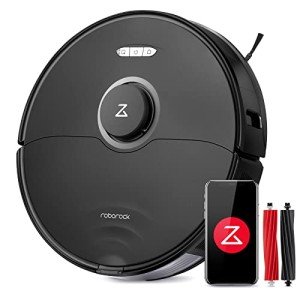A Brief History Of The Evolution Of Which Robot Vacuum Cleaner
Which Robot Vacuum Cleaner Should You Choose? A Comprehensive Guide
In today's busy world, convenience and effectiveness are important, and robotic vacuum cleaner s have become a popular service for keeping homes tidy without the hassle of manual vacuuming. With a plethora of models available, choosing the ideal robot vacuum can be overwhelming. This article aims to offer comprehensive insights into what to think about when selecting a robot vacuum, its features, and some often asked questions.
Key Features to Consider
When examining different robot vacuum, numerous key functions can aid in making a notified decision. Below are some essential elements to consider:
1. Suction Power
- The suction power is important for getting dirt and particles effectively. Search for designs with adjustable suction settings for various floor types.
2. Navigation Technology
- Advanced designs utilize laser mapping and cameras, permitting them to browse efficiently around obstacles and draw up rooms for targeted cleaning.
3. Battery Life
- Think about for how long the vacuum can run on a single charge. A longer battery life makes sure more substantial cleaning sessions before needing to recharge.
4. Size and Design
- A compact design enables the robot to clean under furniture and in hard-to-reach areas. Examine dimensions to guarantee it suits your home layout.
5. Dustbin Capacity
- Bigger dustbins require less regular emptying. Assess just how much debris the model can hold before requiring to be cleared.
6. Smart Features
- Connection alternatives, such as Wi-Fi and app control, permit for remote scheduling and tracking. Voice control capabilities through assistants like Alexa or Google Assistant can also boost usability.
7. Rate
- Robot vacuums range from affordable to high-end designs, so consider your cleaning needs and budget when making a decision.
8. Customer Reviews and Warranty
- Research user feedback to understand the strengths and weak points of each model. A solid guarantee can supply comfort about your purchase.
Comparisons of Popular Robot Vacuum Cleaners
To help in understanding the options readily available, here are some popular robot vacuum cleaners and their features in the form of a contrast table:
Model
Suction Power
Battery Life
Navigation Technology
Smart Features
Cost Range
iRobot Roomba i7+
High
Approximately 75 min
Smart mapping
App control, voice control
₤ 600 – ₤ 800
Neato Botvac D7
Medium
As much as 120 min
Laser-guided
App control, No-Go Lines
₤ 600 – ₤ 700
Roborock S7
Extremely High
Up to 180 min
LiDAR Navigation
App control, mop function
₤ 500 – ₤ 650
Eufy RoboVac 11S
Low
Up to 100 min
Random navigation
Push-button control
₤ 250 – ₤ 300
Ecovacs Deebot Ozmo T8
Medium
Approximately 180 minutes
Smart mapping
App control, voice control
₤ 600 – ₤ 750
Price ranges and features go through change, so it's advisable to examine the latest requirements before making a purchase.
Benefits and drawbacks of Robot Vacuum Cleaners
Pros
- Time-Saving: Robot vacuum can automate daily cleaning jobs, releasing up time for other activities.
- Convenience: Many designs can be managed through apps, enabling users to arrange cleaning on-the-go.
- Consistency: Regular cleaning sessions can avoid the accumulation of dirt and allergens in a home.
- Availability: Robot vacuums can reach areas that traditional designs typically can not, such as under furniture.
Cons
- Limited Capacity: Most robot vacuums have a smaller dustbin compared to conventional vacuum, demanding regular emptying.
- Cost: High-end designs can be pricey, and budget designs might lack vital features.
- Surface area Limitations: Some robot vacuums might have problem with particular surfaces, such as high-pile carpets.
- Maintenance: Brushes and filters need regular cleaning and replacement to preserve optimum performance.
Regularly Asked Questions (FAQs)
Q1: How do robot vacuum work?Robot vacuums are geared up with sensors and brushes that assist them browse a room while gathering dirt and debris. Their intelligent mapping technology allows them to produce a layout of the home, making it possible for efficient cleaning patterns.
Q2: Can robot vacuums clean several surfaces?Yes, most robot vacuum are created to deal with a range of surface areas, including wood, tile, and low to medium-pile carpets. Nevertheless, some might be less effective on high-pile carpets.
Q3: How often should I run my robot vacuum?It's generally suggested to run a robot vacuum a minimum of when a week. However, homes with family pets or big quantities of foot traffic may benefit from everyday cleaning.
Q4: Are robot vacuums worth the financial investment?If time and benefit are high top priorities, a robot vacuum can be a beneficial financial investment. It automates a necessary task, enabling homeowners to concentrate on other jobs.
Q5: How much noise do robot vacuum cleaners make?A lot of robot vacuums run at a noise level comparable to conventional vacuums but may differ by design. Research user examines for noise levels if this is an issue.
Selecting the right robot vacuum requires mindful factor to consider of multiple factors, including suction power, navigation technology, and special functions. By weighing advantages and disadvantages while comparing popular models, consumers can discover the very best fit for their cleaning requires. As robot vacuum technology continues to progress, their capabilities and cost are most likely to improve, making them a valuable addition to the modern home.
